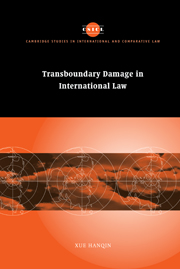Foreward
Published online by Cambridge University Press: 22 July 2009
Summary
International law has always recognized that its basic principle of territorial integrity cannot completely safeguard a state from physical damage originating outside of its borders. The principal response of international law has been to impose responsibility on a state guilty of causing the damage and accordingly to require that state to desist from the conduct causing the damage and in addition to accord adequate reparation to the injured state. These basic ideas, simple in conception and generally accepted, are the starting point of Dr. Xue's wide-ranging examination of the contemporary law and practice applicable to claims by state for physical damage originating in or caused by other states.
In recent years this age-old subject has taken on new dimensions as Dr. Xue's study amply demonstrates. New technology, industrial development and population growth have vastly increased the extra territorial damage. Polluted waters, toxic wastes, oil spills, industrial accidents, ozone gaps have challenged governments and the international legal system to seek remedies. The world-wide expressions of concern have not only called for international action; they have also sensitized national governments and their public to the need both for protective action and for the peaceful settlement of the disputes especially those that threaten violence. Dr. Xue does not reach for “pie in the sky” in her examination of issues and solutions. Her years of practical experience on behalf of her government and her participation in international meetings have given her a realistic understanding of the bond between territorial integrity and sovereignty.
- Type
- Chapter
- Information
- Transboundary Damage in International Law , pp. ix - xiiPublisher: Cambridge University PressPrint publication year: 2003

